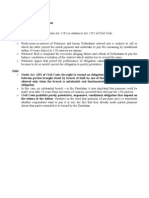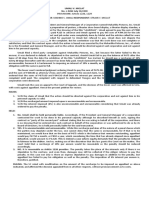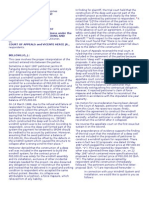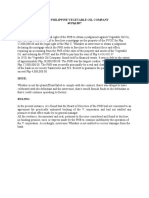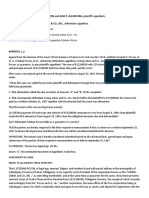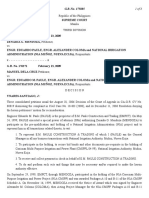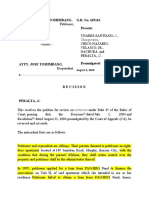Case Summary
Case Summary
Uploaded by
AlvinCopyright:
Available Formats
Case Summary
Case Summary
Uploaded by
AlvinOriginal Title
Copyright
Available Formats
Share this document
Did you find this document useful?
Is this content inappropriate?
Copyright:
Available Formats
Case Summary
Case Summary
Uploaded by
AlvinCopyright:
Available Formats
JOSEFINATAYAG, RICARDO GALICIA, TERESITAGALICIA, EVELYN GALICIA, JUAN GALICIA, JR.
and
RODRIGO GALICIA, petitioners,
vs.
COURT OF APPEALS and ALBRIGIDO LEYVA, respondents
GR NO. 96053 PONENTE: DATE: DIGESTED BY:
Perlas-Bernabe J. September 16, Liane Vina G. Ocampo
2015
PETITIONER/S: RESPONDENTS:
JOSEFINATAYAG, RICARDO COURT OF APPEALS and ALBRIGIDO
GALICIA, TERESITAGALICIA, EVELYN LEYVA
GALICIA, JUAN GALICIA, JR. and
RODRIGO GALICIA,
FACTS:
The heirs of Juan Galicia brought an action for breach of the conditions on the deed of
conveyance executed by Juan Galicia in favor of private respondent, Albrigido
Leyvaunder the following terms:
P3,000.00 is HEREBY acknowledged to have been paid upon the execution of
this agreement;
P10,000.00 shall be paid within ten days from and after the execution of this
agreement;
P10,000.00 represents the VENDORS' indebtedness with the Philippine
Veterans Bank which is hereby assumed by the VENDEE; and
P27,000.00 shall be paid within one year from and after the execution of this
instrument.
There is no dispute that the sum of P3,000.00 listed as first installment was received by
Juan Galicia, Sr. According to petitioners, of the P10,000.00 to be paid within ten days
from execution of the instrument, only P9,707.00 was tendered to, and received by,
them on numerous occasions from May 29, 1975, up to November 3, 1979. Concerning
private respondent's assumption of the vendors' obligation to the Philippine Veterans
Bank, the vendee paid only the sum of P6,926.41 while the difference the indebtedness
came from Celerina Labuguin. Petitioners asserted that the P27,000.00 was not paid to
them. Because of the apprehension that the heirs of Juan Galicia, Sr. are disavowing
the contract inked by their predecessor, private respondent filed the complaint for
specific performance.
The trial court upheld private respondent's theory on the basis of constructive fulfillment
under Article 1186 and estoppel through acceptance of piecemeal payments In
accordance with the provisions of Article 1235 of the Civil Code.
Anent the P10,000.00 specified as second installment, the lower court counted against
the vendors the candid statement of Josefina Tayag who and made the admission that
the check issued as payment thereof was nonetheless paid on a staggered basis when
the check was dishonored. Regarding the third condition, the trial court noted that
plaintiff below paid more than P6,000.00 to the Philippine Veterans Bank but Celerina
Labuguin, the sister and co-vendor of Juan Galicia, Sr. paid P3,778.77 which
circumstance was construed to be a ploy under Article 1186 "for the purpose of
withdrawing the title to the lot". The acceptance by petitioners of the various
payments even beyond the periods agreed upon, was perceived by the lower court as
tantamount to faithful performance of the obligation pursuant to Article 1235 of the
Civil Code. Furthermore, the trial court noted that private respondent consigned
P18,520.00, an amount sufficient to offset the remaining balance, leaving the sum of
P1,315.00 to be credited to private respondent.
ISSUE (S):
Whether the payments actually took place?
RULING:
YES. It is clear that the second instalment has been paid to the heirs of the deceased.
Because of Josefina Tayag's admission in court that she was paid P10 000, Juan Galicia,
Sr. was fully liquidated. Therefore, petitioner's assertion that "the evidence in the register
does not support this conclusion" is incorrect.
As regards the third issue of the contract, it may be recalled that: Article 1186 of the Civil
Code has been applied by the respondent court to constructive fulfilment. which
petitioners claim should not have been appreciated because they are the obligees while
the proviso in point speaks of the obligor. But, petitioners must concede
that in a reciprocal obligation like a contract of purchase, both parties are mutually
obligors and also obliges, and any of the contracting parties may, upon non-fulfillment
by the other privy of his part of the prestation, rescind the contract or seek fulfillment
(Article 1191, Civil Code).
In short, it is puerile for petitioners to say that they are the only obligees under the
contract since they are also bound as obligors to respect the stipulation in permitting
private respondent to assume the loan with the Philippine Veterans Bank which
petitioners impeded when they paid the balance of said loan. As vendors and
expected to carry out the final deed of sale as soon as the balance is paid in full as
determined subsequently.
IMPORTANT PHRASES, QUOTES,TERMS (not the main doctrine) MENTIONED IN
THIS CASE
Principle of anticipation, Income Productivity approach, just compensation
You might also like
- #18 Sarmiento vs. JavellanaDocument3 pages#18 Sarmiento vs. JavellanaRaymond Faeldoña100% (1)
- ELCANO v. HILL 77 SCRA 98Document2 pagesELCANO v. HILL 77 SCRA 98Gervin Arquizal100% (1)
- Heirs of Bacus VDocument5 pagesHeirs of Bacus VNeil Aubrey GamidoNo ratings yet
- The Decision Appealed From Is Affirmed, With Costs Against Appellant. So OrderedDocument6 pagesThe Decision Appealed From Is Affirmed, With Costs Against Appellant. So OrderedEinnasujLesiuqNo ratings yet
- PCIB v. CA, G.R. No. 121989, 481 SCRA 127, 21 January 2006Document11 pagesPCIB v. CA, G.R. No. 121989, 481 SCRA 127, 21 January 2006Mary Rose MendozaNo ratings yet
- Facts:: Astrid A. Van de Brug V. Philippine National Bank, GR No. 207004, 2018-06-06Document3 pagesFacts:: Astrid A. Van de Brug V. Philippine National Bank, GR No. 207004, 2018-06-06ellyn suwalawanNo ratings yet
- 15. UCPB Leasing and Finance Corp. v. Heirs of Leporgo, Sr.Document10 pages15. UCPB Leasing and Finance Corp. v. Heirs of Leporgo, Sr.janinejorvina2023No ratings yet
- 6 Neplum vs. Orbeso, G.R. No. 141986, 11 July 2002Document1 page6 Neplum vs. Orbeso, G.R. No. 141986, 11 July 2002jenniferthefifthNo ratings yet
- Fil-Estate Properties Vs Spouses Go (GR No 185798, 13 Jan 2014)Document3 pagesFil-Estate Properties Vs Spouses Go (GR No 185798, 13 Jan 2014)Wilfred MartinezNo ratings yet
- GR NO 175833 People V MalicsiDocument2 pagesGR NO 175833 People V Malicsibaguiostudent2600No ratings yet
- Carpio v. Valmonte, G.R. No. 151866, September 9, 2004Document9 pagesCarpio v. Valmonte, G.R. No. 151866, September 9, 2004Jennilyn Gulfan YaseNo ratings yet
- 6 Manzano vs. LazaroDocument7 pages6 Manzano vs. LazaroJessie Marie dela PeñaNo ratings yet
- 13 Paculdo Vs RegaladoDocument12 pages13 Paculdo Vs RegaladoEMNo ratings yet
- Sales and Lease Course Outline SY2020 - 2021 (SBCA)Document11 pagesSales and Lease Course Outline SY2020 - 2021 (SBCA)Anne DerramasNo ratings yet
- Valeroso V CA FullDocument6 pagesValeroso V CA FullAbigail TolabingNo ratings yet
- 4 Tanguilig vs. CADocument2 pages4 Tanguilig vs. CACJ CasedaNo ratings yet
- 2 GR 119064Document12 pages2 GR 119064Aj M. DeeNo ratings yet
- G.R. No. 177983Document5 pagesG.R. No. 177983Joses Nino AguilarNo ratings yet
- Vda de Mistica v. NaguiatDocument1 pageVda de Mistica v. NaguiatIrene RamiloNo ratings yet
- Commissioner of Internal Revenue Vs Court of Appeals, Et AlDocument2 pagesCommissioner of Internal Revenue Vs Court of Appeals, Et AlDon Michael ManiegoNo ratings yet
- CASE DIGEST - GR No. 103507Document7 pagesCASE DIGEST - GR No. 103507Juvy CambayaNo ratings yet
- Malabanan Vs RamentoDocument2 pagesMalabanan Vs RamentoMiko TrinidadNo ratings yet
- Based On The Book, Statutory Construction by Ruben E. AgpaloDocument10 pagesBased On The Book, Statutory Construction by Ruben E. AgpalopieNo ratings yet
- Sun Life Insurance v. CA and Emilio Tan G.R. No. 89741 (1991) FactsDocument1 pageSun Life Insurance v. CA and Emilio Tan G.R. No. 89741 (1991) FactsRod Ralph ZantuaNo ratings yet
- Pendon V Diasnes - ExceptionDocument10 pagesPendon V Diasnes - ExceptionRobin Scherbatsky100% (1)
- 15 Eastern Shipping Lines V CADocument2 pages15 Eastern Shipping Lines V CARaquel ChingNo ratings yet
- BA1 BPI Vs Lifetime MarketingDocument1 pageBA1 BPI Vs Lifetime MarketingNicole SantoallaNo ratings yet
- Consti AssssDocument117 pagesConsti AssssPBWGNo ratings yet
- Umali v. Miclat 105 Phil 1109 Oblicon AjeDocument1 pageUmali v. Miclat 105 Phil 1109 Oblicon AjeAje EmpaniaNo ratings yet
- Sales de Leon Compiled IncDocument55 pagesSales de Leon Compiled Incvenus mae b caulinNo ratings yet
- Persons Family RelationsDocument64 pagesPersons Family RelationsDodong LamelaNo ratings yet
- Right Against Self-Jeopardy Corpus, Jr. v. Pamular, G.R. No. 186403, September 5, 2018. FactsDocument4 pagesRight Against Self-Jeopardy Corpus, Jr. v. Pamular, G.R. No. 186403, September 5, 2018. FactsNJ LinNo ratings yet
- 138577-1978-Tugade v. Court of Appeals PDFDocument4 pages138577-1978-Tugade v. Court of Appeals PDFLucio GeorgioNo ratings yet
- Couturier V Hastie 1856 (Discharge of Contract)Document3 pagesCouturier V Hastie 1856 (Discharge of Contract)gooti100% (1)
- Case Digest GR No. 233774Document2 pagesCase Digest GR No. 233774Taniya100% (1)
- Smith Bell v. Sotelo Matti, 44 Phil. 875 (1922)Document4 pagesSmith Bell v. Sotelo Matti, 44 Phil. 875 (1922)Fides DamascoNo ratings yet
- Tanguilig v. CA, 266 SCRA 78 (1997)Document4 pagesTanguilig v. CA, 266 SCRA 78 (1997)Fides DamascoNo ratings yet
- Persons and Family RelationsDocument7 pagesPersons and Family Relationsgem closaNo ratings yet
- Mindex Resources Development VDocument2 pagesMindex Resources Development VKidMonkey2299No ratings yet
- Republic vs. Gingoyon G.R. No. 166429 December 19, 2005Document41 pagesRepublic vs. Gingoyon G.R. No. 166429 December 19, 2005AkiNiHandiongNo ratings yet
- Obligations and Contract - Atty Niedo: ARTICLE 1156Document5 pagesObligations and Contract - Atty Niedo: ARTICLE 1156Carlo ImperialNo ratings yet
- Rodzssen Supply v. Far EastDocument2 pagesRodzssen Supply v. Far EastMarion Nerisse KhoNo ratings yet
- Rodrigo Enriquez, Aurea Soriano de Dizon and Urbano Dizon, JR., Plaintiffs-Appellants, Socorro A. Ramos, Defendant-AppelleeDocument6 pagesRodrigo Enriquez, Aurea Soriano de Dizon and Urbano Dizon, JR., Plaintiffs-Appellants, Socorro A. Ramos, Defendant-AppelleefebwinNo ratings yet
- PNB vs. Philippine Vegetable Oil Company 49 Phil 897 FactsDocument2 pagesPNB vs. Philippine Vegetable Oil Company 49 Phil 897 FactsJay Mark EscondeNo ratings yet
- 4-Cinco V CanonoyDocument2 pages4-Cinco V CanonoyAngela Louise SabaoanNo ratings yet
- Pimentel v. People GR 172060Document5 pagesPimentel v. People GR 172060rejNo ratings yet
- Cacayorin v. Armed Forces and Police Mutual Benefit AssociationDocument13 pagesCacayorin v. Armed Forces and Police Mutual Benefit AssociationRainNo ratings yet
- BPI vs. SarmientoDocument5 pagesBPI vs. SarmientoJeryl Grace FortunaNo ratings yet
- Olegario v. CA (Feli) DoctrineDocument3 pagesOlegario v. CA (Feli) DoctrineMina AragonNo ratings yet
- Jespajo Realty Corp. v. Court of AppealsDocument10 pagesJespajo Realty Corp. v. Court of AppealsLorebeth EspañaNo ratings yet
- Criminal Law Case Digests HernandoBar2023-2Document110 pagesCriminal Law Case Digests HernandoBar2023-2Lalj BernabecuNo ratings yet
- Piczon V Piczon GR No L29139Document3 pagesPiczon V Piczon GR No L29139Mary LeandaNo ratings yet
- 15&43-Mendoza v. Paule G.R. No. 175885 February 13, 2009Document8 pages15&43-Mendoza v. Paule G.R. No. 175885 February 13, 2009Jopan SJ100% (1)
- de Guia vs. Manila ElectricDocument3 pagesde Guia vs. Manila ElectricFairyssa Bianca SagotNo ratings yet
- ADM. CASE No. 3319 June 8, 2000 LESLIE UI, Complainant, ATTY. IRIS BONIFACIO, Respondent. de Leon, JR., J.Document101 pagesADM. CASE No. 3319 June 8, 2000 LESLIE UI, Complainant, ATTY. IRIS BONIFACIO, Respondent. de Leon, JR., J.Michaela GarciaNo ratings yet
- OBLICONDocument21 pagesOBLICONJennifer OceñaNo ratings yet
- Case Digest DELTA MOTOR CORPORATION v. EDUARDA SAMSON GENUINODocument1 pageCase Digest DELTA MOTOR CORPORATION v. EDUARDA SAMSON GENUINORoe DeeNo ratings yet
- Tomimbang V TomimbangDocument11 pagesTomimbang V TomimbangChristiane Marie BajadaNo ratings yet
- Japrl Vs Security Bank Corporation G.R. No. 190107 June 6, 2011 FactsDocument3 pagesJaprl Vs Security Bank Corporation G.R. No. 190107 June 6, 2011 FactsMythel SolisNo ratings yet


















